|
As we continue through this “Year of St. Joseph” as proclaimed by Pope Francis in his Apostolic Letter Patris Corde, one cannot help but reflect on St. Joseph: adoptive father of Jesus, spouse to the Blessed Virgin Mary, and Patron of the Universal Church. These lofty and impressive titles have been given to a man who in many respects is seen as humble, consistently in the background, and having no words come from his mouth in Scripture. His example of what it means to be a man and a father is one men can strive for. As a father of a precocious one-year-old, I cannot help but look for examples of how to be a father. Of course, we often look to our own fathers, grandfathers, friends, and perhaps even godfathers and spiritual fathers through the priesthood. There are many qualities that we can emulate from these father figures in our lives, indeed very practical ones. How to change diapers without a mess; how to look good while carrying an undersized backpack filled with wipes, pacifiers, and a change of clothes; or at what posture to best steer that not-tall-enough stroller? What prayers should we be introducing to our young family? How can we strive to provide for our child both practically and spiritually? However, I would suggest another figure to look to: St. Joseph. When my son was baptized, a friend of ours – who happens to be named Joseph – gifted to him (and to us) a statue of St. Joseph. At the time, I considered it more of a funny coincidence, and a nice gesture. As I continued to reflect on it, I really began to see it as providential. Admittedly, as a new father, I was scared and anxious (I still am). St. Joseph undoubtedly faced many of the same anxieties. However, throughout Scripture he is portrayed as a man who sorts out problems and comes up with solutions in practical and brave ways. It is this particular quality that I think we, as fathers, should take as a noble example. There will be times throughout our fatherhoods when we will come to face challenges, confusion, and doubt. St. Joseph protected the Holy Family and trusted in the word of God when it was easy not to trust. As fathers we are called to protect our own families, not necessarily always from harm or danger, and also to provide an example of kindness, love, and humility that so often is characterized as weak. Instead, I invite you to seek St. Joseph’s noble example and see these qualities as a strength. We also need to trust in God. Pope Francis says in Patris Corde, “The greatness of Saint Joseph is that he was the spouse of Mary and the father of Jesus. In this way, he placed himself, in the words of Saint John Chrysostom, 'at the service of the entire plan of salvation.'” Let us as fathers follow in St. Joseph’s noble example to place ourselves at the service of God’s plan for us. Then we will truly be able to serve our families without fear or anxiety. For more on St. Joseph, read our blog post: “Ite Ad Joseph: 10 Quotes to Celebrate the Year of St. Joseph.” **This blog was originally published on April 15, 2021.** **This photo is from: https://cmmb.org/st-joseph-devotions-your-weekly-reflection-from-cmmb/**
0 Comments
What does it mean to be a spiritual father? For me, the answer is found in the experience of fathers that I have known or know. Some are biological fathers, others are father-figures, such as older relatives and friends, priests, and religious brothers. Each in his own way showed me how to love in a fatherly way. Spiritual fatherhood is loving universally, not particularly. The love of Christ that urges us on is one that loves all, no matter what. That is not easy to do, and I fail more often at it than I succeed. The only way that spiritual fatherhood is possible is through cooperation with the grace of Christ. A spiritual father is one who is aware of the working of grace in his life and assists others in recognizing the movement of grace in their own. Good spiritual fatherhood does not just happen. Yes, for me, after ordination to the priesthood, people started to call me “Father.” It is true that one is configured to Christ in a unique way through the Sacrament of Holy Orders. Cooperation with the grace of the Sacrament is over a lifetime, though. One grows into spiritual fatherhood, even as a priest. In the first few years of priesthood, I tried to be of service to others by being present to them in their sorrow and their joy. The most profound moments were in listening and accompanying others. I learned not to say much, but simply to be with them, to walk with them as they deepened their life in Christ. Today, my approach to spiritual fatherhood is similar, but with the experience of walking with others sometimes for many years. I have found that they choose to be in such a relationship with me, not simply as a priest, but also as one who is a flawed follower of Christ. A good spiritual father does not claim perfection, but instead is very aware of his faults and failings, as well as the grace of Christ that is working in and through him. Pope Francis offers this consideration in Christus Vivit: “An especially important quality in mentors is the acknowledgement of their own humanity – the fact that they are human beings who make mistakes: not perfect people but forgiven sinners” (246). Good spiritual fathers are keenly aware that they are “forgiven sinners.” When that is forgotten by a spiritual father, then the focus becomes on self, not on Christ. He is the one who forgives sin and gives the grace to love unconditionally and universally for he, and he alone, is God, the Infinite Love. Click here to read more reflections on fatherhood during the Year of St. Joseph.
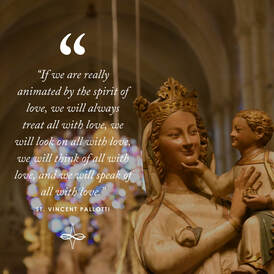 What motivates us to do what we do? If it is love, then we are called to “will the good of another” (St. Thomas Aquinas quoted in the Catechism of the Catholic Church, 1766). The object of our love is not ourselves or our self-interest. It is God and neighbor. St. Vincent Pallotti universalizes love in this way: “If we are really animated by the spirit of love, we will always treat all with love, we will look on all with love, we will think of all with love, and we will speak of all with love” (OOCC III, 338). This type of love requires sacrifice and generosity. Of course, the greatest act of love was the sacrifice of Christ on the Cross. We see generosity and sacrifice in the Blessed Virgin Mary saying “yes” to the Angel Gabriel and St. Joseph setting aside what he wanted to do and always doing the will of God. Sacrificing ourselves for the other, thinking not of self, but the other, is not a typical way of behaving. We seem to be able to do it on a small scale with those closest to us, which is the place to start. Bit by bit, through self-sacrifice, a generosity of spirit grows, love grows. Does this happen on its own? No, the Holy Spirit is moving in and through each of us. The grace of God gives us the ability to sacrifice and be generous, moving us toward universal love. May the charity of Christ urge us on!
It is rare to find a moment of silence in a household with a two-year-old. Last week, unusually, provided many quiet moments as my normally energetic daughter had a high fever and spent the day on the couch or sleeping only while being held. My wife and I took turns silently holding her to help her get much needed rest. Sitting in silence—without a phone or other distraction--was agitating at first. As the time went on, the simple time spent in silence holding a sleeping child became nourishing and awakened in me a hunger for silence that I often spend time avoiding. This past Lent, I co-led an online small group for newly married men in DC. As we reflected on how the life of St. Joseph relates to us as men, we returned almost weekly to the challenge of finding silence amid phones and families. St. Joseph was not a character that most of us had taken seriously before being married or becoming a father. Yet in marriage and fatherhood, Joseph is the silent role model we need. Someone who understands us and who inspires us. St. Joseph was not a loud or flashy saint. In the children’s books of saints we have for our daughter, the life of silent St. Joseph is hardly mentioned. How can he compete with traveling missionaries, miracle workers, religious founders, and the stories of martyrs losing their heads, eyes, and more? Though his life was not extroverted or bloody, it was no less meaningful. The life of Joseph was a life of daily martyrdoms and silent missions. Without having to leave his home or his workshop, he set out each day as a missionary to offer his life for Jesus and Mary. This is reassuring to me as a husband and father of a toddler, who has been stuck at home during the last 12 months during the COVID pandemic. It is tempting to think that the only way to be holy is to be on the move or to be noticed, like the many Catholic social media influencers or popular Catholic priests or bishops. St. Joseph reminds us of a quieter, ordinary path to holiness that will earn us no new likes or followers. He shows us a hidden, silent example that we need in the noise of daily life. Joseph’s silence teaches us to rediscover the silent mission work found in our own kitchens and living rooms. The artist and Oblate Brother Mickey McGrath has a beautiful image of “St. Thérèse Doing the Dishes.” In the painting, Thérèse is at the kitchen sink elevating a plate as the priest elevates the Eucharist at the altar. This image makes plain our mission as lay men and women to unite our daily work and sacrifices to the great sacrifice of Jesus on the cross which we commemorate at each Eucharistic celebration. Perhaps this image of St. Thérèse doing dishes stands out today because our dishwasher broke this week and my mission field has been researching dishwasher pumps and motor assemblies and spending extra time in soapy water. The image reminds me that God has called me to this mission, regardless of whether it is my preference or how qualified I feel for the task. Joseph must have felt the same way in the ordinary tasks of his workshop and home. St. Joseph is a role model for how we are called to integrate our lives, finding God in every moment of our day—whether doing dishes, praying the Rosary, updating spreadsheets, or building a table. In the life of Joseph, daily work “is a kind of prayer, a way of finding God, a means of salvation…Joseph gave to his carts and yokes the same care he would have given to a tabernacle, since he understood perfectly that a word done in love goes straight to God” (Michel Gasnier, Joseph the Silent, 29). Pope Francis reminds us that, “working persons, whatever their job may be, are cooperating with God himself, and in some way become creators of the world around us” (Patris Corde, 6). St. Joseph is well known for not having a single word recorded in Scripture, but we cannot confuse his silence with a lack of mission. Joseph was a silent missionary who invites us in this Year of St. Joseph to join him in the quiet work. The silent mission of holding a sick child who has fallen asleep, of holding our tongue from an uncharitable word with a family member or colleague, of doing the dishes, or of going about our work with love. Silently. Without recognition. Like St. Joseph. As we continue through this “Year of St. Joseph” as proclaimed by Pope Francis in his Apostolic Letter Patris Corde, one cannot help but reflect on St. Joseph: adoptive father of Jesus, spouse to the Blessed Virgin Mary, and Patron of the Universal Church. These lofty and impressive titles have been given to a man who in many respects is seen as humble, consistently in the background, and having no words come from his mouth in Scripture. His example of what it means to be a man and a father is one men can strive for.
As a father of a precocious one-year-old, I cannot help but look for examples of how to be a father. Of course, we often look to our own fathers, grandfathers, friends, and perhaps even godfathers and spiritual fathers through the priesthood. There are many qualities that we can emulate from these father figures in our lives, indeed very practical ones. How to change diapers without a mess; how to look good while carrying an undersized backpack filled with wipes, pacifiers, and a change of clothes; or at what posture to best steer that not-tall-enough stroller? What prayers should we be introducing to our young family? How can we strive to provide for our child both practically and spiritually? However, I would suggest another figure to look to: St. Joseph. When my son was baptized, a friend of ours – who happens to be named Joseph – gifted to him (and to us) a statue of St. Joseph. At the time, I considered it more of a funny coincidence, and a nice gesture. As I continued to reflect on it, I really began to see it as providential. Admittedly, as a new father, I was scared and anxious (I still am). St. Joseph undoubtedly faced many of the same anxieties. However, throughout Scripture he is portrayed as a man who sorts out problems and comes up with solutions in practical and brave ways. It is this particular quality that I think we, as fathers, should take as a noble example. There will be times throughout our fatherhoods when we will come to face challenges, confusion, and doubt. St. Joseph protected the Holy Family and trusted in the word of God when it was easy not to trust. As fathers we are called to protect our own families, not necessarily always from harm or danger, and also to provide an example of kindness, love, and humility that so often is characterized as weak. Instead, I invite you to seek St. Joseph’s noble example and see these qualities as a strength. We also need to trust in God. Pope Francis says in Patris Corde, “The greatness of Saint Joseph is that he was the spouse of Mary and the father of Jesus. In this way, he placed himself, in the words of Saint John Chrysostom, 'at the service of the entire plan of salvation.'” Let us as fathers follow in St. Joseph’s noble example to place ourselves at the service of God’s plan for us. Then we will truly be able to serve our families without fear or anxiety. For more on St. Joseph, read our blog post: “Ite Ad Joseph: 10 Quotes to Celebrate the Year of St. Joseph.” Having enjoyed being a father for many years, upon learning of the impending birth of a grandchild, I looked forward eagerly to that day. (I even considered the shirt I was wearing when I heard the news to be my “lucky shirt.”) Now, about seven years later, I am truly delighted with my two lovely granddaughters, as they approach the ages of seven and three. They are beautiful in every way, but I especially appreciate the beauty of their hearts and souls. This I attribute gratefully to their mother and father and to God in His goodness. As a grandfather, I have been fortunate to spend much time with my granddaughters both before and after the onset of the COVID pandemic. And, especially as a grandfather, I see St. Joseph as an inspirational role model. My view of St. Joseph is of a man who was comfortable and happy remaining, for the most part, in the background. He evidently found no need to be the center of attention. He simply did his work caring and providing for Mary and Jesus and likely for anyone else who came within the ambit of his responsibilities. He worked hard at his craft and traveled as necessary to keep his family safe. It seems that he did not need to say much using words. I see his example as a goal for me as a grandfather—to be there when needed, to try to promote the health, safety and general well-being of my wife, children, and grandchildren and otherwise—specifically as to grandchildren—to remain when possible in the background, with support and occasional contributions to their physical, spiritual and psychological educations. But being a grandfather is far from only being work and encompassing responsibility. It is mostly about the joy and wonder of being together with grandchildren—to see firsthand the development of human beings gaining strength in mind, body, and soul. I imagine that St. Joseph was pleased but often surprised by the growth and development of Jesus as a child, young boy, and young man. With St. Joseph’s likely experience in mind, I can try to recognize and realize that growth and development is not necessarily predictable. I am constantly surprised by what my granddaughters can do and what they can express in words that seem beyond their years. They are most entertaining and one of a grandfather’s delightful duties is not only to be entertained but also to be able to join in the games and play activities sparked by the imagination of young children. The great value of having the life of St. Joseph as a guide is that there is value in simple presence—being there, experiencing life with young persons, seeing the world through their eyes, noticing and appreciating the moon, stars, or sun, or the dog or cat on the street. Being with grandchildren is akin to what I have often thought about going camping—it makes simple things complicated and complicated things simple. As I anticipate spending more time with my granddaughters, I continue to look to St. Joseph for guidance. As part of my daily prayers, I ask St. Joseph for his intercession for all of us. From his unique role in God’s plan, St. Joseph is well-situated to be an advocate for those of us still on our journeys. What better team could we find to assist us in this manner than our Blessed Mother Mary and St. Joseph? They were holy persons, who during their lives on earth experienced a full range of joys, sorrows, and challenges, and are thus in a great position to sympathize and empathize with us and to advocate for us as we try to work our ways through the many opportunities presented to us to be of service to one another. **This post is part of our series on Fatherhood to celebrate the Year of St. Joseph. To learn more, please click here. For more resources on Marriage and Family, please click here.
Next week is Holy Week. Before we arrive there and enter the most solemn of days of the Church year, the Easter Triduum, we come to another Solemnity during the Lenten season. Last week, it was the Solemnity of St. Joseph, spouse of the Blessed Virgin Mary and patron of the Universal Church. Tomorrow, it is the Solemnity of the Annunciation of the Lord. Both offer us examples of how to respond to God’s action in our lives. The Blessed Virgin Mary and St. Joseph responded freely and fully to God’s invitation announced by the angel to move in directions that they did not expect. While we may not have an angel announcing God’s will for us, in what ways do we discern the direction that we are called to take? Recently, I attended the religious profession of a Benedictine monk who is a former student of mine. Some of those who attended the Mass and profession ceremony in support of him were also former students who are now either diocesan or religious priests or married with children. (Some are also former staff members and collaborators of the Center.) Each in their own way has followed God’s invitation to them. In and through their chosen vocations, they have found joy in living more deeply their Christian life.. While they have found joy, they also know what it means to take up the cross and follow Jesus Christ as his disciples. None of them made the choices that they did easily, but did so through cooperation with the grace of Christ. We are called to the same. Holy Week offers us an important opportunity to reflect, discern, and act on God’s will in our lives. Join us on social media for our Virtual Holy Week retreat. We offer it as a way of doing this type of discernment in the context of this most solemn time. Please know that our prayers are with you, especially during the Easter Triduum and season. May the charity of Christ urge us on!
As someone who has always looked forward to the next challenge or opportunity both personally and professionally, I haven’t been very skilled at pausing and reflecting on the past. Writing this passage challenged me to settle myself enough to reflect on my journey as a Catholic father, and for that I am thankful as it contains many opportunities for me to continue to grow as both a Catholic and a father. My journey as a Catholic father is closely intertwined with my Catholic faith. My mother was a practicing Catholic and was always engaged in parish life. She also was a Catholic school teacher for many years. As a result, my sister and I were raised Catholic. In my case, this included attending Catholic school during my primary years and attending a Catholic university. I, like many other young Catholics, made my way to becoming an adult in the Catholic Church through Confirmation. While residing at home led by my mother, my sister and I were actively involved in our local parish. My first set of real-life religious decisions came when I went away to college at the University of Notre Dame. At this point, my religion did not feel like it was my own. It felt like it was my mother’s religion and my connection to it was not as clear. During my years at Notre Dame, a campus with over 150 venues in which to pray or attend Mass, somehow I managed to not regularly attend Mass. During my college years, I met my wife of now 32 years. She, like my mother, was an active Catholic who felt sure of her connection to her faith. During our early years of marriage, while she strongly modeled the Catholic faith with regular Mass attendance and engagement in parish life, I once again managed to get by with a part-time Catholic mentality while still searching for how Catholicism would be “my faith” rather than my mother’s or my spouse’s. But my wife and my mother were role models who kept me close to the Catholic Church during this period of uncertainty and questioning. After being married for just over 3 years, my wife and I conceived our first child. After she was born, we immediately began preparations for our daughter’s first step into the Catholic faith with the sacrament of Baptism. During this process, I had a real awakening: many of the questions I had been asking regarding my faith suddenly seemed selfish and self-serving. Although I felt I was prepared to be a father, I felt helpless in many ways to control the events that would impact my daughter throughout her life. It became clear to me that our daughter, and a few years later our son, would certainly need the love and support of their parents. However, they would also need something more—something that would sustain and anchor them throughout their lives regardless of the circumstance or challenge. This was faith, the Catholic faith. Not only would our children need this faith, but so would I. The blessing of fatherhood for me came with many gifts. My Catholic faith had become planted in some very good soil and, as a result of my fatherhood, began to grow. As our children grew up and became adults, my journeying with them as a father, husband, Catholic, and business leader has had its challenges. There was always an endless stream of competing day to day priorities. It was disappointing when, despite all our best efforts to keep all the balls in the air, inevitably some would drop. Reflecting back, it was being present at those moments that gave my fatherhood and faith deeper meaning—when our children wanted to reach out for support, advice, a kind ear, or just to talk about their journey through both life and faith. In some cases, my children might not see the connection between their life journey and their faith journey, as I certainly didn’t a number of years ago. This provides a great opportunity as a father to create these connections for my children as they become full participants in our society and ultimately leaders in their communities, parishes, and professional lives. Having grown in my faith throughout my vocation as a father, I hope that I can be for my children the same role model of a loving, thriving Catholic faith that my mother presented to me. On December 8th, the Solemnity of the Immaculate Conception of the Blessed Virgin Mary and the 150th anniversary of the proclamation of St. Joseph as patron of the universal church, Pope Francis proclaimed the Year of St. Joseph. To celebrate this historic moment in the universal Church, the Catholic Apostolate Center has launched a series exploring the depth and richness of fatherhood. We will feature one post a month from fathers at different stages of fatherhood, godfathers, spiritual fathers, priests, and grandfathers throughout the year. We invite you to join us this year in learning more about masculinity, fatherhood, the dignity of labor, and the importance of faithfulness to the will of God. As we continue in our life of faith, we invite St. Joseph to be a father to each one of us, guiding us ever closer to his adopted son, Jesus. May he teach us how to be faithful disciples constantly adoring the face of Christ. To kick off our fatherhood series, I’d like to share some powerful quotes from Pope Francis’ Apostolic Letter, Patris Corde, that will help us more deeply come to know the quiet carpenter who helped raise the Son of God. 1. “Each of us can discover in Joseph – the man who goes unnoticed, a daily, discreet and hidden presence – an intercessor, a support and a guide in times of trouble. Saint Joseph reminds us that those who appear hidden or in the shadows can play an incomparable role in the history of salvation.” Throughout salvation history, God has repeatedly chosen the least likely of candidates to accomplish his will. Moses was slow of speech. Peter was a fisherman. Paul was a persecutor of the Church. Joseph was a carpenter. What matters not to the Lord is our status in life, our accolades, our prestige, or our mightiness, but simply that we do His will. St. Joseph modeled that in every moment of his life—from accepting Mary into his home, to naming his Son Jesus, from fleeing to Egypt, to returning to Nazareth. St. Joseph, teach us obedience and humility. 2. “The greatness of Saint Joseph is that he was the spouse of Mary and the father of Jesus. In this way, he placed himself, in the words of Saint John Chrysostom, 'at the service of the entire plan of salvation.'[7]” Joseph was a father in every sense of the word. He guided and protected his family, provided for them, and loved them with tender affection. Everything he did was for the well-being of Mary and Jesus. He is a strong servant leader—one that all men can learn from. To be a father is a great blessing and gift. St. Joseph, help us to be servant leaders. 3. "Saint Paul VI pointed out that Joseph concretely expressed his fatherhood 'by making his life a sacrificial service to the mystery of the incarnation and its redemptive purpose. He employed his legal authority over the Holy Family to devote himself completely to them in his life and work. He turned his human vocation to domestic love into a superhuman oblation of himself, his heart and all his abilities, a love placed at the service of the Messiah who was growing to maturity in his home.'[8]" Just as faith without works is dead, so too is love devoid of service. St. Joseph did not love solely with his words, but by his actions—which is likely why Scripture does not recount any of his speech—with St. Joseph, there was no need. His entire life was a song of love for the Holy Family and for God. St. Joseph, teach us to love as you loved. 4. "Joseph saw Jesus grow daily 'in wisdom and in years and in divine and human favour' (Lk 2:52). As the Lord had done with Israel, so Joseph did with Jesus: he taught him to walk, taking him by the hand; he was for him like a father who raises an infant to his cheeks, bending down to him and feeding him (cf. Hos 11:3-4)." So often, we confuse holiness with otherworldliness. Perhaps we imagine celestial music, bright light, and the presence of angels accompanying the saints wherever they went. But to be holy is to be most fully human—at St. Iraneus said, “The glory of God is man most fully alive.” True holiness means living out our vocations fully, and that includes family life. St. Joseph would have fed Christ and eaten with him, he would have helped him get dressed or tied his sandals, he would have played games with him, sang with him, and worked with him. To be holy is not to be out of touch with reality. St. Joseph was not above the normal duties of fatherhood. St. Joseph, teach us to live out our vocations fully by taking Christ by the hand. 5. "Even through Joseph’s fears, God’s will, his history and his plan were at work. Joseph, then, teaches us that faith in God includes believing that he can work even through our fears, our frailties and our weaknesses. He also teaches us that amid the tempests of life, we must never be afraid to let the Lord steer our course. At times, we want to be in complete control, yet God always sees the bigger picture." A life of holiness does not mean one devoid of fear or suffering. This was true even for Joseph and Mary. What makes Joseph such a model for us is not that he was fearless, but that he trusted in God. He did many things that were difficult and probably not what he had intended for his life, but he trusted and obeyed. He hears the will of God and acts. Later on, Christ himself does not promise a life without the cross, but that He will always remain with us as we carry our crosses. It is when we give God our fears, frailties, and weaknesses that He can transfigure us for His glory. St. Joseph, teach us to trust God. 6. "During the hidden years in Nazareth, Jesus learned at the school of Joseph to do the will of the Father. That will was to be his daily food (cf. Jn 4:34)." The home of the Holy Family was a domestic church in which virtue flourished and sanctity was cultivated. As the head of the family, Joseph served as a priestly figure and an earthly shadow of God the Father. Joseph would have been a man of Scripture who obeyed God’s commandments and lived a life of authenticity and virtue. How beautiful it is to think that Jesus “learned at the school of Joseph.” St. Joseph, teach us to do the will of the Father. 7. "Just as God told Joseph: 'Son of David, do not be afraid!' (Mt 1:20), so he seems to tell us: 'Do not be afraid!' We need to set aside all anger and disappointment, and to embrace the way things are, even when they do not turn out as we wish. Not with mere resignation but with hope and courage. In this way, we become open to a deeper meaning. Our lives can be miraculously reborn if we find the courage to live them in accordance with the Gospel. It does not matter if everything seems to have gone wrong or some things can no longer be fixed. God can make flowers spring up from stony ground. Even if our heart condemns us, 'God is greater than our hearts, and he knows everything'(1 Jn 3:20)." The words of God to Joseph echo once more for us today: do not be afraid! Fear, stress, and confusion are all normal to the human condition. God is not asking us to erase these feelings from our lives, but to give them over to Him. He is calling us to abandon ourselves to His loving providence and not become imprisoned by these emotions. St. Joseph may have feared for his family’s safety and well-being, but he was not consumed by fear or paralyzed by doubt. Pope Francis calls him, “creatively courageous.” “In the face of difficulty,” he writes, “we can either give up and walk away, or somehow engage with it.” Joseph engaged. St. Joseph, teach us to abandon ourselves to God. 8. "Work is a means of participating in the work of salvation, an opportunity to hasten the coming of the Kingdom, to develop our talents and abilities, and to put them at the service of society and fraternal communion. It becomes an opportunity for the fulfilment not only of oneself, but also of that primary cell of society which is the family." Work is a part of God’s plan for humanity. What was not part of God’s plan was toil or fruitless labor that does not uphold mankind’s dignity. Prior to the Fall, Adam was called to till and cultivate the land. Christ has redeemed work once again by enabling us to offer all that we do and unite it to His sacrifice on the Cross. Our work can now have immeasurable meaning and be a means of sanctification. Joseph is also known as St. Joseph the Worker. He worked as a carpenter throughout his life and in this way provided for his family. When we work for others, when we work well and faithfully, our work can be a means of building up the Body of Christ and loving or serving one another. St. Joseph, teach us the dignity of human labor. 9. "Fathers are not born, but made. A man does not become a father simply by bringing a child into the world, but by taking up the responsibility to care for that child. Whenever a man accepts responsibility for the life of another, in some way he becomes a father to that person." Fatherhood is so much more than physical procreation. It involves the cultivation of family and of the human person. It means providing for the spiritual or physical well-being of others. For this reason, priests are also called “Father.” They represent our Heavenly Father and make manifest His graces poured out in the sacraments. They accompany us on our spiritual journeys and act as shepherds guiding us towards holiness. Godfathers, too, play an important role in society by serving as models of holiness for their godchildren and praying and interceding on their behalf. St. Joseph, teach men true masculinity and authentic fatherhood. 10. "The Church too needs fathers." Not only do families need fathers and stable father figures, the Church and world do as well. Authentic fatherhood is an essential part of God’s plan for humanity and is a part of God’s very identity. Society cannot exist and thrive without healthy and holy fathers. God chose to enter the world through a family and was obedient to his foster father Joseph while under his care. Scripture tells us that he "was obedient to them (Joseph and Mary).” St. Joseph, help raise up strong and loving fathers and father figures in our Church and society. As we journey together in the Year of St. Joseph, let us pray to this powerful intercessor using the prayer of Pope Francis, Hail, Guardian of the Redeemer, Spouse of the Blessed Virgin Mary. To you God entrusted his only Son; in you Mary placed her trust; with you Christ became man. Blessed Joseph, to us too, show yourself a father and guide us in the path of life. Obtain for us grace, mercy and courage, and defend us from every evil. Amen. On August 15th, the Solemnity of the Assumption of our Blessed Virgin Mother into heaven, we celebrate Mary’s completion of life on Earth and her existence in eternity with Jesus. We can reflect on her sinless life as she was chosen by God to be the mother of Christ and also on her example of motherhood, grace, and virtue.
On this Marian feast, I feel a special closeness to the Blessed Mother because I recently found out that, I too, am preparing to be a mother. I ask for Mary’s intercession for a healthy pregnancy often and I hope to love more each day like she did. From her moment of saying, “Yes!” to God at a young age, to her worried searching for Jesus in the Temple, and even to her urging of her son at the Wedding at Cana to begin his ministry, Mary is a mother we can relate to. Her faith in God kept her focus on Jesus and his growth, safety, and well-being on Earth in order to ensure that he would fulfill his life’s mission to save us all from sin. Mary is the mother we can all imitate. Mary’s life was probably not an easy one. She faced speculation and ridicule from those in her community when she gave her Fiat and said yes to God’s plan. She lived at a time when a pregnant and unwed woman could be outcast from everyone she knew, but she persisted and trusted. Enduring these hardships could create doubt in someone’s mind and dissuade a person, but Mary stayed true to her grace-filled faith. I like to imagine that her cousin Elizabeth was a kindred spirit for Mary, someone who could support her and was also full of grace and faith. Joseph too, said “Yes!” to God, took Mary as his wife, and raised Jesus with strength and grace. He was a supporter for Mary and loved her, fully knowing his purpose as a protector and provider for the family. Throughout her life, we know that Mary reflected and pondered on the many blessings she had received. Scripture tells us she held them in her heart. Let us appreciate those special moments in our lives, too! Recently, I’ve been trying to take a moment each day to “hold things in my heart” and reflect on the goodness of God. Sometimes it’s when I see the sunshine for the first time that day. Other times it’s at the end of the day in a more reflective manner, and still other times it is in a crucial or stressful moment as I search for the good in what’s going on around me. There are many times throughout our days in which we could pause, reflect on a blessing, and have a grateful moment of prayer. On this Assumption, I challenge you to imitate Mary and learn from her grateful heart in this way. Below is a prayer from the Liturgy of the Hours, a method of prayer that seminarians, priests, religious sisters, deacons, and lay people participate in all over the world. This particular prayer is prayed on the feast of the Assumption. As we celebrate the Assumption of Mary, let us look to her example of faith and devotion and let us ask her to continue to bring us closer to Christ and help us to live for his glory. Almighty God, You gave a humble Virgin the privilege of being mother of your Son, and crowned her with the glory of heaven. May the prayers of the Virgin Mary bring us to the salvation of Christ and raise us up to eternal life. We ask this through our Lord Jesus Christ your Son who lives and reigns with you and the Holy Spirit, one God, forever and ever. Amen. St. Joseph was a man for the ages. I like to think of Joseph as a man that walked the walk and only talked if it was necessary. I imagine that he went about his life quietly and out of the spotlight, worked hard in his carpentry, and spent time with his family in Nazareth. Imagining Joseph living today, I have similar imagery: he works for his father’s woodworking business, devotes time in his day for quality family time, and volunteers on weekends. I can picture the same figure then and now. Can you?
St. Joseph’s March 19th Solemnity celebrates faith, fatherhood, and fortitude in a way that brings people together. St. Joseph is the patron saint of the Universal Church, fathers, families, expectant mothers, travelers, immigrants, craftsmen, and many more! People all around the world look to Joseph as a model for their lives because of his deep faith, warm fatherhood, and fortitude. His deep faith evidenced in his “Yes” to marry the Virgin Mother. As we read in the Gospel of Matthew (Mt 1:18-19), Joseph was a kindhearted man who loved Mary so much that he was willing to risk his reputation. He was ready to stick by her through the betrothal and pregnancy and figure it out later, as we might say today. Matthew’s phrase is “divorce her quietly.” Scripture also tells us that God sent his angel in a dream to straighten things out with Joseph: “Joseph son of David, do not be afraid to take Mary home as your wife, because what is conceived in her is from the Holy Spirit. She will give birth to a son, and you are to give him the name Jesus, because he will save his people from their sins.” Certainly, only a man of true faith would hear these words and trust in God’s plan. His protection of the Holy Family and warmth while raising Jesus as his own. Although there is little written about Jesus’ life as a boy before his ministry, we can be sure that Joseph took great care of the Son entrusted to his care. Even when Jesus was a baby, Joseph protected him from death (Mt 2:19-23), presented Jesus at the Temple as was customary (Luke 2:22), and taught him his carpentry trade. This real-life example of fatherhood is one that lends its patronage to all fathers today. In my experience, my dad modeled the fatherhood of St. Joseph when he taught me that working hard in the service of others is one of our greatest duties on Earth. My dad also taught me perseverance. And finally, my dad taught me about optimism—an outlook on life that is forever reaching toward hope and success. Fathers have a model to emulate in St. Joseph’s quiet support and care for his family. His fortitude to face the world in times of adversity. At important times in Joseph’s life, he was challenged by God. In those moments, he rose to the challenge by making a selfless choice. In our lives as Catholics, we are often challenged at times of weakness or when life seems hard. Negativity can seem endless, problems pile on top of other problems, media stories show no hope, and family life is full of brokenness. When we are faced with these challenges, it is important to remember our forefathers in faith. We, like St. Joseph, must put our trust in God and entrust to him our lives and those of our loved-ones as well. The tumultuous world we live in will never have hope if we as Catholics are not the first ones to share God’s love. St Joseph is the perfect model of faith, fatherhood, and fortitude that we need in today’s world. Here is a short prayer to St. Joseph for his intercession. Pray this and feel God lift away your fears and despair. Oh St. Joseph whose protection is so great, so strong, so prompt before the throne of God, I place in you all my interests and desires. Oh St. Joseph do assist me by your powerful intercession and obtain for me from your divine son all spiritual blessings through Jesus Christ, our Lord; so that having engaged here below your heavenly power I may offer my thanksgiving and homage to the most loving of fathers. Oh St. Joseph, I never weary contemplating you and Jesus asleep in your arms. I dare not approach while he reposes near your heart. Press him in my name and kiss his fine head for me, and ask him to return the kiss when I draw my dying breath. St. Joseph, patron of departing souls, pray for us. Amen. 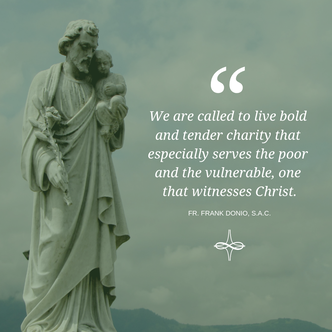 March 19th marks the Solemnity of St. Joseph, Spouse of the Blessed Virgin Mary and Patron of the Universal Church. These are rather lofty titles. He has many others. I first came to know St. Joseph, not only through the Nativity story, but because he was the patron of my parish church in Hammonton, New Jersey. As a child, I would look at the statue of St. Joseph to the right of the main altar and saw a wise looking, older person holding the child Jesus. His face was kind and tender, yet strong. Only later did I admire the work of the artist who was able to capture the essence of St. Joseph. Pope Francis, whose sixth anniversary of the inauguration of his ministry as pope is also on March 19th, reflected on these and other aspects of St. Joseph and what they mean for us: “In the Gospels, Saint Joseph appears as a strong and courageous man, a working man, yet in his heart we see great tenderness, which is not the virtue of the weak but rather a sign of strength of spirit and a capacity for concern, for compassion, for genuine openness to others, for love. We must not be afraid of goodness, of tenderness!” (Pope Francis, Homily, March 19, 2013) Charity or love, St. Thomas Aquinas tells us is “to will the good of the other.” (CCC, 1766). Goodness is not simply about being polite. It is much more than that. It is an opportunity to live love of neighbor in a way that is strong and bold at times. It is a way of showing love of God. Consider what St. Joseph did for Mary in taking her into his home (Mt. 1:24) or in moving the family to Egypt at a moment’s notice (Mt. 2:14). These were in response to God’s invitation to do so – an invitation that came in dreams. We are called to live bold and tender charity that especially serves the poor and the vulnerable, one that witnesses Christ. This is at the heart of the Lenten practice of almsgiving. It is this type of charity that “urges us on” as St. Paul tell us (2 Cor. 5:14). Pope Francis witnesses it, St. Vincent Pallotti lived it, and we are all called to do the same. May the Charity of Christ urge us on! 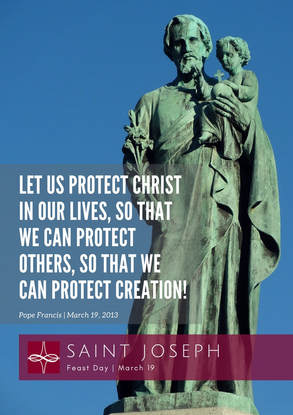 "In the Gospels, Saint Joseph appears as a strong and courageous man, a working man, yet in his heart we see great tenderness, which is not the virtue of the weak but rather a sign of strength of spirit and a capacity for concern, for compassion, for genuine openness to others, for love. We must not be afraid of goodness, of tenderness!" - Pope Francis (Homily for the Beginning of the Petrine Ministry of the Bishop of Rome, March 19, 2013) Blessings on this Solemnity of St. Joseph! As we celebrate this feast day of the Patron of the Universal Church, we also celebrate the fifth anniversary of the beginning of the Petrine ministry of Pope Francis. He chose this day particularly for this event and later inserted an invocation of St. Joseph into all the Eucharistic Prayers, not simply Eucharistic Prayer I (Roman Canon). Pope Francis not only invites us to see St. Joseph as protector of the Universal Church, but also calls us all to be protectors who live with tenderness that shows the love of Christ. What does it mean to be a "protector"? In the same homily quoted above, he offers us an answer, which he witnesses as pope. "In [St. Joseph], dear friends, we learn how to respond to God's call, readily and willingly, but we also see the core of the Christian vocation, which is Christ! Let us protect Christ in our lives, so that we can protect others, so that we can protect creation! The vocation of being a "protector", however, is not just something involving us Christians alone; it also has a prior dimension which is simply human, involving everyone. It means protecting all creation, the beauty of the created world, as the Book of Genesis tells us and as Saint Francis of Assisi showed us. It means respecting each of God's creatures and respecting the environment in which we live. It means protecting people, showing loving concern for each and every person, especially children, the elderly, those in need, who are often the last we think about. It means caring for one another in our families: husbands and wives first protect one another, and then, as parents, they care for their children, and children themselves, in time, protect their parents. It means building sincere friendships in which we protect one another in trust, respect, and goodness. In the end, everything has been entrusted to our protection, and all of us are responsible for it. Be protectors of God's gifts!" As one can see from the highlights above which link to an encyclical, two apostolic exhortations, and the bull of indiction of the Extraordinary Jubilee of Mercy, Pope Francis outlined in his inaugural homily some of the themes of the teaching of his pontificate. His actions toward those on the peripheries witness as well to how we can both protect and show tenderness, "responding to God's call" as St. Joseph did. For as he said also in his homily, "only those who serve with love are able to protect!" May the Charity of Christ urge us on! This weekend is the feast of St. Patrick—one of the most popular saints in the Archdiocese of Washington where I grew up and arguably in the entire United States. But two days later on March 19, coming much more quietly and with far less fanfare in American culture, slips in the Solemnity of St. Joseph.
It is easy to lose the Solemnity of St. Joseph in the rigors of Lenten observances or because it comes on the heels of the day-long party that seems to happen every year on St. Patrick’s Day. Perhaps we often overlook this feast because we know so little about who St. Joseph was and what his life was like. Nevertheless, St. Joseph remains an incredibly important figure, especially for parents. Joseph is mentioned only a few times in the New Testament. We know from the Gospels that Joseph was a law-abiding and righteous man, and that he obeyed God’s will—especially when it was revealed to him directly by an angel. After these few mentions in the infancy narratives of Jesus, St. Joseph gently fades into the background and then disappears altogether from the Gospels. But the Church in her wisdom has made St. Joseph’s importance clear for those who are paying attention: he is mentioned in all four Eucharistic Prayers at Mass, as well as in the Divine Praises during Benediction at the end of Eucharistic adoration. But what makes St. Joseph so special? From what we can glean from the Gospels, St. Joseph was an ordinary man of deep faith who was called to become the foster-father of Christ. He became the earthly guardian of the Messiah, responsible for his upbringing and tasked with protecting him in his early life. St. Joseph’s commitment to his vocation as the husband of Mary and the foster father of Christ was so strong that upon being warned about the murderous intentions of King Herod, he fled immediately—in the middle of the night!—to Egypt. He did whatever it took, even leaving his entire life behind him, in order to keep his family safe. The little we see of him in the New Testament shows us a devout man who always trusted in God and took care of his family. St. Joseph, as the third member of the Holy Family, is the member who is the most like us—especially those of us who are parents. He was not born sinless, nor was he divine. He was a carpenter, a man of humble station who probably felt as though he had a monumentally important task thrust upon him. I think St. Joseph’s role in Christ’s life beautifully displays the role of a Christian parent in their child’s life. Parents are ordinary people who are tasked with the care and raising of new life. Like Joseph, we do not own our children or have sole claim over them; they are their own people, entrusted to our care and guidance until they grow old enough to do God’s will without our assistance. It is a difficult task, and at times overwhelming to ponder. And yet there is St. Joseph, who was tasked with raising the very Son of God. Joseph shows us that we do not need to be perfect in our roles, only willing to be guided by God as we place our trust in Him. Just as I strive to be like Mary in my vocation as a wife and mother, I pray that my husband will be like Joseph. St. Joseph is the ultimate husband and father, a faithful man of quiet strength, protector of Mary’s virginity, and guide of Christ’s earthly childhood. Above all, St. Joseph shows us the beauty of a life lived in obedience to God’s will. Questions for Reflection: How can you grow closer to St. Joseph throughout this Lenten season? What can you learn from St. Joseph’s example of obedience and trust? When my husband and I were preparing for marriage, we spent time in reflection and prayer carefully choosing our Mass readings. It was such an exciting decision to make, and we prayed that the readings would reflect and inspire us in our marriage and all whom we would witness to by our marriage. Some of these same readings will be read at Masses across the world on the upcoming feast of the Holy Family, serving as a reminder of how we can live as reflections of the Holy Family in our daily lives. In the second reading, Paul tells the Colossians, “Put on, as God's chosen ones, holy and beloved, heartfelt compassion, kindness, humility, gentleness, and patience” (Col 3:12). Just like Mary, Joseph, and Jesus, we are God’s beloved, chosen and loved by God, and with that, we are called to live by these same virtues that Paul shares with the Colossians. The stories of Mary and Joseph consistently show us their lives of humility and gentleness. I think of Mary’s fiat (Luke 1:38), Joseph’s obedience to the angel of the Lord (Matthew 1:24), or how Mary and Joseph took Jesus to be presented in the temple in this weekend’s Gospel (Luke 2:22-40). Just like Mary and Joseph, we are called to serve and love God with faithfulness that is radical, but gentle and sweet. What does this faithfulness look like? For the Holy Family, not only did it manifest in the stories we read about in Scripture, but also in the mundane moments of the every day. Mary nursed Jesus as an infant, Joseph taught him carpentry, and Jesus served his parents and brought them joy! Jesus carried this love in his ministry that nurtured all to whom he preached, and it continues to carry on in the legacy of the Church. These little acts of faithfulness yielded enormous fruits and carried the Holy Family through times of immense suffering. As I feel overwhelmed with my day to day duties of family life as a wife and mother, or my job as a teacher, I find comfort in knowing that perhaps Mary and Joseph felt these demands, too. They were faithful to their vocations, to each other, and to the Lord. Life is a balancing act, but with “Christ dwell[ing] in you richly,” like the Holy Family, all can be done in love, “do[ing] everything in the name of the Lord Jesus” (Col 3:17). You show faithfulness when you do the dishes, when you submit an assignment for work or school, when you make the bed. You show faithfulness when you play with your children, when you have coffee with a friend, when you stop and pray. You show faithfulness when you show up to Mass. Opportunities for faithfulness, humility, and gentleness are in the every day, both big and small. Through these opportunities for faithfulness I have learned that God is never outdone in generosity. He wants to bless us and let us know His love, and He does this in the most profound way when we show Him our faithfulness and love, just as the Holy Family has modeled for us. As we continue to navigate the demands of our daily lives, let us cling to the intercession of the Holy Family, that we may be gentle and humble, showing radical faithfulness in all that we do. Question for Reflection: What are some opportunities to show for faithfulness in your life? For more resources on Marriage and Family, click here. Alyce Shields is a teacher in Washington D.C.
|
Details
Archives
July 2024
Categories
All
|
About |
Media |
© COPYRIGHT 2024 | ALL RIGHTS RESERVED

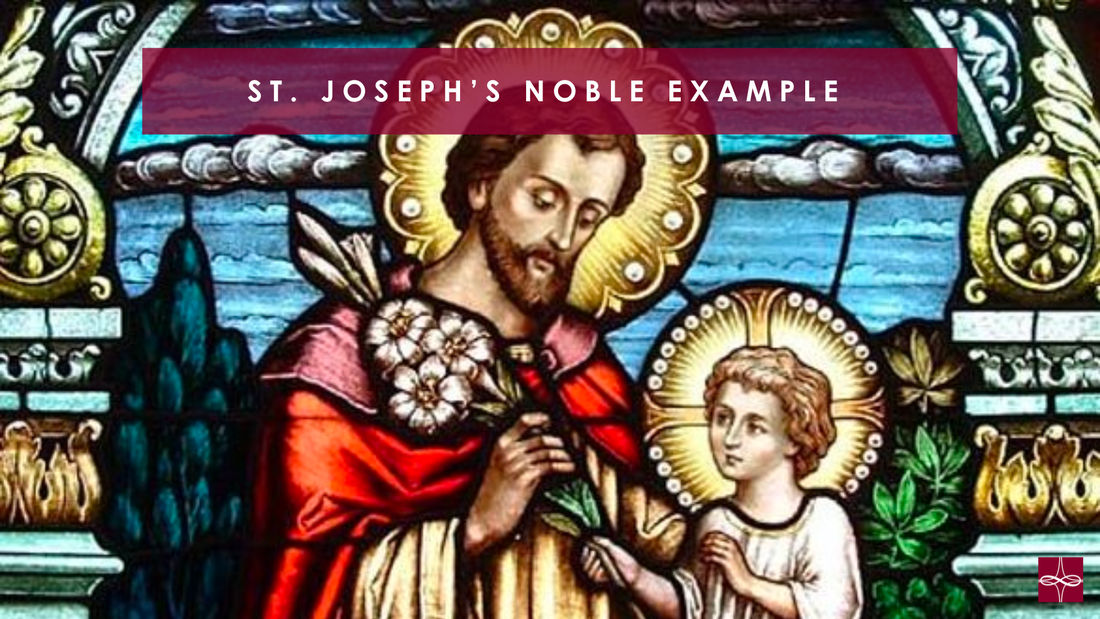
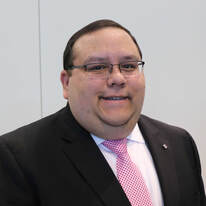
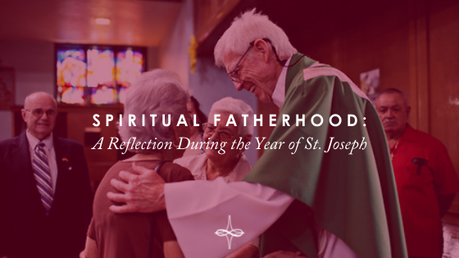
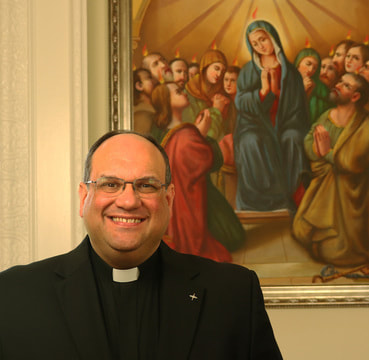
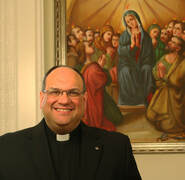
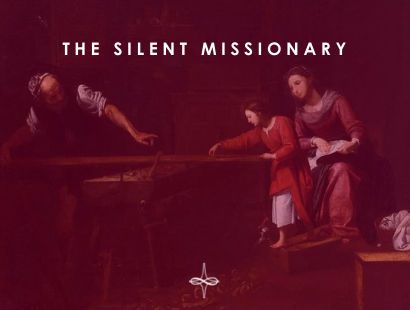

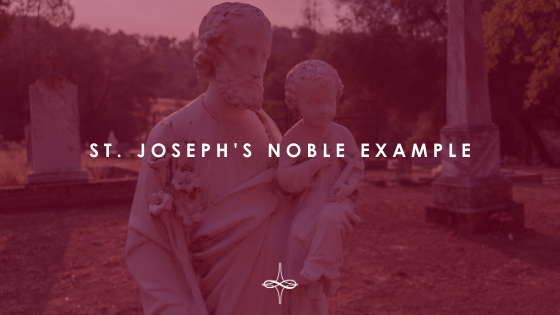




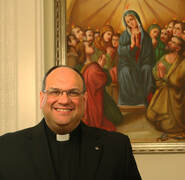


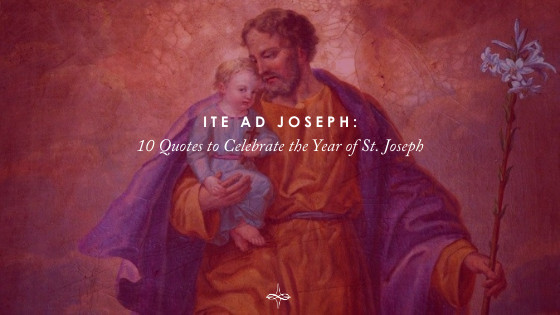

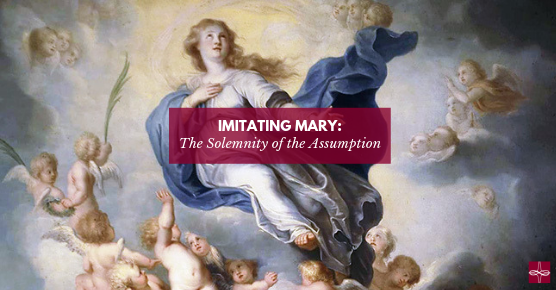

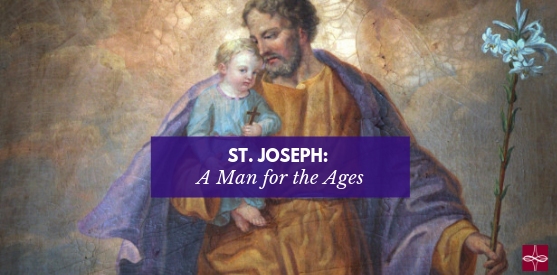

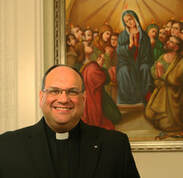
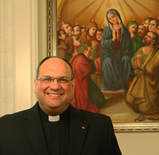
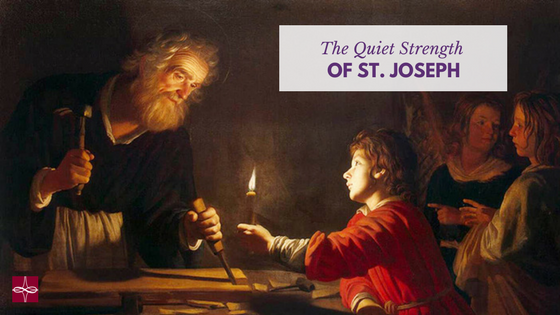

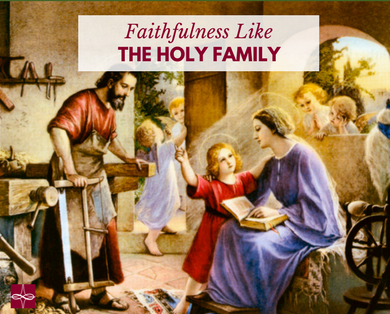
 RSS Feed
RSS Feed